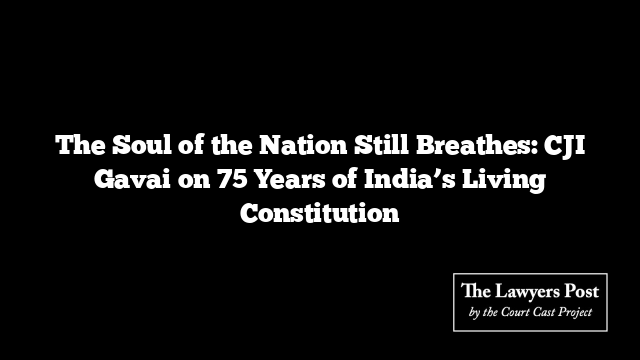In the hallowed halls of London’s legal corridors, where history speaks in echoes and precedent holds weight, India’s constitutional heartbeat was felt loud and clear. At an event commemorating 75 years of the Constitution of India, Chief Justice of India Bhushan Ramkrishna Gavai reminded the world that this wasn’t just a celebration of a legal document—it was a salute to the soul of a nation still under construction.
Hosted by Lady Justice Geraldine Andrews and India’s High Commissioner to the UK, the lecture titled “The Living Document: 75 Years of the Constitution of India, and the Enduring Relevance of Dr. B.R. Ambedkar” wasn’t merely ceremonial—it was constitutional storytelling at its finest, narrated with reverence, reflection, and the unmistakable voice of continuity.
A Gathering of Gravitas
Judges, diplomats, ministers, and legal minds filled the room, but the true centerpiece was an idea—the Constitution, not as paper and print, but as spirit and scaffolding. Opening the floor, Lady Arden of the UK Supreme Court hailed India’s constitutional success in harmonizing a vast and diverse population. “It is not a relic, it is an engine,” she noted, pointing to how it withstood crises and still stood firm. Her tribute to Ambedkar wasn’t just respect—it was recognition of a radical mind who fused democratic ideals with India’s complex social weave.
Justice Vikram Nath, in his tribute, struck the personal and the political in one clean note: the Constitution didn’t just shape the nation—it gave it a conscience. From remote virtual courts to schoolkids reciting the Preamble, he painted a picture of a living, breathing constitutional culture.
A Personal Constitution
Then came Justice Gavai. Standing at a podium in the land where Ambedkar once studied law, he connected past to present like few could. “This is personal,” he said—and it was. Gavai spoke not just as Chief Justice but as the son of a man who championed Ambedkar’s values at the grassroots. For him, the Constitution wasn’t a climb—it was the ladder.
Ambedkar’s vision, he said, made space for a boy from a municipal school to rise to the highest echelons of India’s judiciary. “That’s the power of a living Constitution,” he declared—not just that it exists, but that it transforms.
From Text to Terrain
Justice Gavai recounted the Constitution’s journey through landmark cases, from Kesavananda Bharati to Indra Sawhney, showing how its bones—Fundamental Rights and Directive Principles—aren’t rivals but partners, “like the twin wings of a chariot.”
He spoke of Article 32, Ambedkar’s “heart and soul” of the Constitution, and underscored that a right without remedy is a hollow promise. He pointed to the evolving interpretation of Article 21—where life means dignity, education, health, even clean air—as evidence of the Constitution’s elasticity and endurance.
But Gavai also sounded a note of caution. Political democracy, he warned, is fragile if not fortified by social and economic justice. Quoting Ambedkar, he reminded the audience: liberty, equality, and fraternity must march together—or not at all.
From Parliament to Pavement
Arjun Ram Meghwal, India’s Law Minister, offered a broader lens—of grassroots governance, of citizens’ duties, and of Ambedkar not just as lawgiver but as labor economist and social reformer. He recalled Ambedkar’s fierce advocacy for international-standard labor rights and insisted that Ambedkar’s vision was not limited to law—it was a manifesto for justice in the broadest sense.
The Constitution, Meghwal said, helped India stay united in diversity and progressive in principle, even as democracies elsewhere faltered. “It is not just a document of governance,” he concluded. “It is India’s moral compass.”
Not a Monument, But a Movement
Seventy-five years on, the Indian Constitution still grows. It argues with itself. It listens. It changes course. It holds firm. And it still tells millions: you matter.
What this event in London made clear is that Dr. Ambedkar didn’t just give India a Constitution. He gave it a direction—and that direction, even now, is forward. Justice Gavai’s closing words captured it best: “Independent India and its Constitution were born together—and they have grown together. The journey isn’t done. But the foundation has never been firmer.”
This was more than a lecture. It was a reaffirmation: the Constitution is alive—and still learning to speak for everyone.





